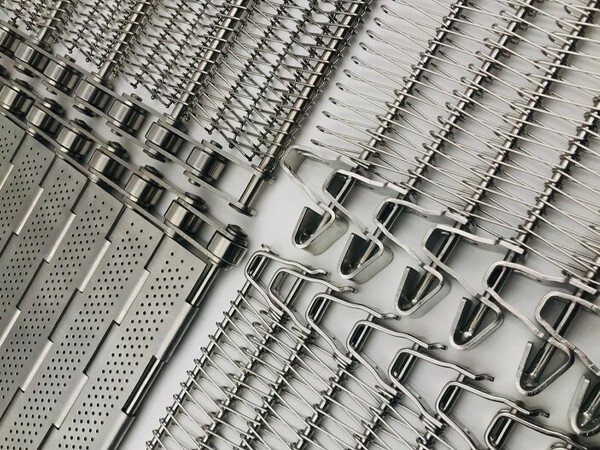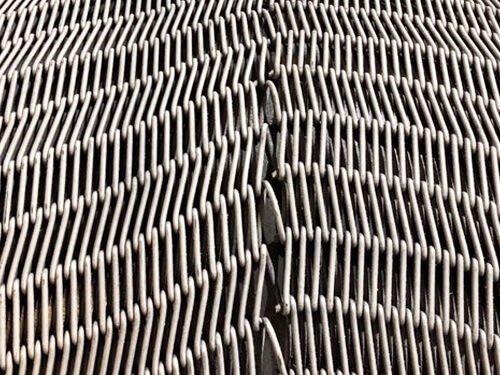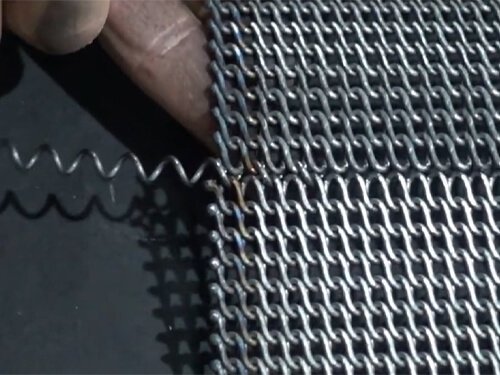Wire mesh conveyor belts are vital components in various industrial processes, facilitating the movement of materials efficiently and reliably. Choosing the appropriate material for your wire mesh conveyor belt is crucial to ensure optimal performance and longevity. In this guide, we’ll explore commonly used materials for wire mesh conveyor belts and provide a detailed comparison to help you make informed decisions.


Commonly Used Materials
Wire mesh conveyor belts are manufactured using a variety of materials, each offering unique properties suited to different applications. Common materials include:
- Carbon Steel
- Galvanised Mild Steel
- Chrome Molybdenum (3% Chrome)
- Stainless Steel (e.g., 304, 321, 316, 316L, 314, 310, 430)
- Nickel Chrome (37/18, 80/20)
- Inconel (e.g., 600, 601)
Differences Between Materials
Each material exhibits distinct characteristics in terms of operating temperature, corrosion resistance, strength, and cost. Here’s a brief overview of the differences:
- Carbon Steel: Relatively low cost but susceptible to corrosion.
- Galvanised Mild Steel: Offers good corrosion resistance due to zinc coating but limited temperature resistance.
- Chrome Molybdenum: Provides high-temperature resistance but moderate corrosion resistance.
- Stainless Steel: Offers excellent corrosion resistance and temperature resistance, with various grades suitable for different environments.
- Nickel Chrome: Known for exceptional high-temperature resistance but comes with a higher cost.
- Inconel: Provides superior high-temperature and corrosion resistance, ideal for demanding applications but at a premium price.
Comparison Table
Here’s a detailed comparison table for commonly used wire mesh conveyor belt materials:
| Material | Operating Temperature (°C) | Advantages | Disadvantages | Applications |
|---|---|---|---|---|
| Carbon Steel (40/45) | Up to 550°C | – Low cost | – Susceptible to corrosion | General industrial, sorting, screening |
| Galvanised Mild Steel | Up to 400°C | – Low cost – Good corrosion resistance | – Zinc coating may wear off over time | Agricultural, drying, cooling |
| Chrome Molybdenum (3% Chrome) | Up to 700°C | – High temperature resistance | – Moderate corrosion resistance | High-temperature industrial processes |
| 304 Stainless Steel | Up to 750°C | – Excellent corrosion resistance – High temperature resistance | – Higher cost compared to carbon steel – May not be suitable for extremely high-temperature applications | Food processing, heat treating, drying |
| 321 Stainless Steel | Up to 750°C | – Enhanced resistance to intergranular corrosion – Good weldability | – Relatively high cost – Limited availability | Chemical processing, aerospace, automotive |
| 316 Stainless Steel | Up to 800°C | – Superior corrosion resistance | – Higher cost compared to 304 stainless steel | Food processing, chemical processing |
| 316L Stainless Steel | Up to 800°C | – Low carbon content for improved corrosion resistance – Good weldability | – Higher cost compared to carbon steel – May not be necessary for all applications | Food processing, chemical processing, pharmaceuticals |
| 314 Stainless Steel | Up to 1120°C (Avoid use at 800-900°C) | – Exceptional high-temperature resistance – Good strength and oxidation resistance | – Very high cost – Limited availability | Heat treating, industrial furnaces, aerospace |
| 310 Stainless Steel | Up to 1150°C | – Excellent high-temperature resistance | – Higher cost compared to some other stainless steels – Limited availability | Heat treating, industrial furnaces, chemical processing |
| 430 Stainless Steel | Up to 815°C | – Good corrosion resistance in mild environments – Relatively low cost | – Lower temperature resistance compared to other stainless steels – Limited high-temperature applications | Food processing, automotive trim, appliances |
| 37/18 Nickel Chrome | Up to 1120°C | – Superior high-temperature resistance | – Very high cost | Aerospace, industrial furnaces, chemical processing |
| 80/20 Nickel Chrome | Up to 1150°C | – Superior high-temperature resistance | – Very high cost | Aerospace, industrial furnaces, chemical processing |
| Inconel 600 | Up to 1150°C | – Exceptional high-temperature resistance | – Very high cost | Aerospace, chemical processing, marine engineering |
| Inconel 601 | Up to 1150°C | – Exceptional high-temperature resistance | – Very high cost | Aerospace, chemical processing, power generation |
Conclusion
Selecting the right material for your wire mesh conveyor belt is essential for optimizing performance and durability in your industrial processes. Consider factors such as operating temperature, corrosion resistance, strength, and budget constraints when making your decision. By understanding the differences between materials and referring to the comparison table provided, you can confidently choose the most suitable material for your specific application needs.






